The Home Office
 The Home Office: a reader asked…
The Home Office: a reader asked…
Hi Chris, I’ve recently retired and am setting up my own home-based business. Do you have some recommendations on what technology I need to outfit my new office? I will need to hold my clients’ private data and files securely, and need to be able to do the usual office-y things. Please assume I have nothing yet, and need everything. Oh, and I’m partial to Macs but not committed. Thank you!
Your home-based business can have many of the same office technology needs as any other type of business. You need to make and receive phone calls, need reliable email services, can benefit from electronic calendar and customer relationship management tools. You’ll need to be able to print and copy things (possibly in color), and also scan documents and other items to make electronic versions. So here’s my quick-list of things you might want or need to outfit your home office. I’m going to assume that you’ve already got a space picked out and furnished with desk, chair(s), lighting etc., and that you’ve got a good internet connection (either wired or Wi-Fi).
Computer: This can be a Mac or a Windows PC, and can be a desktop or laptop. You can certainly benefit from having a nice keyboard and mouse or trackpad, and a large screen (or better yet two screens) would be a bonus. Here are some things to think about, some choices and options:
For maximum flexibility working both at your desk and being mobile, you may want to pair a reasonably powered laptop with a secondary (largish) monitor, and an external keyboard and mouse or trackpad. You’ll probably want a second power adapter so you can leave the main one at the desk, and just grab your laptop and go, with another power adapter in your briefcase. Whichever you choose, make sure it’s outfitted with a Solid-state hard drive, which gives you a big boost in system speed and capability. Don’t be overly concerned about the amount of hard drive space, as I’ll explain in the next section. All told, this will set you back $2-4 thousand.
 Mobile Mac: If you prefer Apple’s wares, then a great arrangement would be a Macbook Pro laptop. If you deal with imagery or video, go for the Retina display, and regardless, the 15″ size will be easier on your eyes (but a bit heavier to lug around). Make sure you have plenty of RAM – 8gb is probably the minimum you want to consider (16gb on the 15″ with Retina display). If you will be working with imagery or video, consider getting the upgraded video adapter. If you’ve a choice of processor speed, only consider an upgrade if you’ll be working with video (such as video editing). Consider an AppleCare protection plan, and choose adapters and other hardware based on your needs. Add a 27″ Apple Thunderbolt Display for a second monitor, and get the external keyboard and mouse or trackpad.
Mobile Mac: If you prefer Apple’s wares, then a great arrangement would be a Macbook Pro laptop. If you deal with imagery or video, go for the Retina display, and regardless, the 15″ size will be easier on your eyes (but a bit heavier to lug around). Make sure you have plenty of RAM – 8gb is probably the minimum you want to consider (16gb on the 15″ with Retina display). If you will be working with imagery or video, consider getting the upgraded video adapter. If you’ve a choice of processor speed, only consider an upgrade if you’ll be working with video (such as video editing). Consider an AppleCare protection plan, and choose adapters and other hardware based on your needs. Add a 27″ Apple Thunderbolt Display for a second monitor, and get the external keyboard and mouse or trackpad.- Mobile Windows PC: Choices abound in laptops, I’d stick with these brands: Lenovo (Thinkpad) & Dell (Latitude or Inspiron, XPS for more power). My experience is that they’ve been very reliable and use higher quality parts than other brands (without charging you a premium for the brand). The larger screen size (+/- 15″) is going to be easier for you to work with, and add a secondary monitor (24″ or larger), as well as a good keyboard and mouse or trackpad. Same as for Macs, you’ll want to consider any adapters or other hardware based on what type of work you’ll be doing.
- If mobility doesn’t matter, you can get a lot more computer for the money with a standard desktop PC. There’s less of that extra value with an iMac because (like laptops) they have to shoehorn hardware into a small case. The same sort of specification requirements for laptops would apply to desktops, although you might find the same specification for a desktop to be much less expensive than for a laptop. You’ll also want the largest monitor you can fit on your desk (or even better, two!), and the keyboard and mouse or trackpad. And a set of speakers (not needed for an iMac).
Data Storage: The laptop’s storage drive space (with SSD) is going to be a big driver of cost, and you mentioned needing to securely store client data, so you’ll want to have a Network-attached Storage (NAS) device. The amount of storage space should be enough to hold all your client files as well as backups of your computer.
 Mac: An Apple Time Capsule is one way to go if you’re an all-Apple home office. A 3tb model will set you back about $400. Although you might want to step up to a more full-featured NAS…
Mac: An Apple Time Capsule is one way to go if you’re an all-Apple home office. A 3tb model will set you back about $400. Although you might want to step up to a more full-featured NAS…- Mac or PC: I really like the Synology brand of NAS’s. These are basically multi-drive storage computers and can be configured with RAID storage profiles to protect against the failure of one hard drive without data loss. They can hold enormous amounts of files, and be configured for secure remote access from anywhere, should you choose. For example, the 5-drive DS1515+ can be outfitted with five identical 8tb drives – that’s 40 terabytes of storage! But you’ll want to configure RAID protection so that if one of the drives fails you won’t lose any data. So if you used economical 4tb drives, the whole shebang would run you about $1,200 and give you 16tb of storage space.
- Mac or PC: Cloud-based storage can be an adjunct to an on-site external storage device, and possibly a replacement (but I wouldn’t). The advantage of a big Dropbox, Google Drive or Amazon Cloud Drive (there are plenty of others) are the available-anywhere aspect of storage space. If you really want security, then consider something like SpiderOak or tresorit. I find cloud-based storage to be a great adjunct to an NAS, good for short-term storage of active projects. That way I can keep my NAS isolated from the internet and the data completely safe.
Sure you can build your own NAS from an older desktop computer, but for reliability and serviceability, I prefer a professional device like the Synology NAS. They have models in all price ranges, but I’d suggest you stick with multi-drive systems so you can run RAID for data protection.
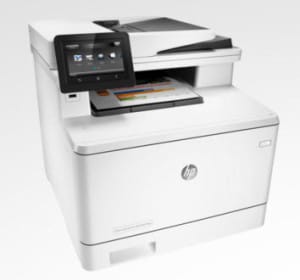 Multi-function Printer: You don’t need separate devices to do printing, scanning, copying and faxing, an all-in-one will serve you just fine. Although color laserjet printers may be a bit more up-front, the cost over their service life is comparable to an inkjet printer. The cost of the device is only a part of the whole, the ink or toner supplies will end up costing you more than the printer originally cost. You want to stay away from the bargain basement tier though, the low quality parts (plastic gears versus metal, lower-quality rubber rollers, etc.) will wear out much quicker. Since there’s so many moving parts subject to wear and tear, you want to get a model that will last a good long while. Here are a few choices:
Multi-function Printer: You don’t need separate devices to do printing, scanning, copying and faxing, an all-in-one will serve you just fine. Although color laserjet printers may be a bit more up-front, the cost over their service life is comparable to an inkjet printer. The cost of the device is only a part of the whole, the ink or toner supplies will end up costing you more than the printer originally cost. You want to stay away from the bargain basement tier though, the low quality parts (plastic gears versus metal, lower-quality rubber rollers, etc.) will wear out much quicker. Since there’s so many moving parts subject to wear and tear, you want to get a model that will last a good long while. Here are a few choices:
- A good mid-tier multi-function device is the HP Color Laserjet Pro M277dw, about $380 at hp.com
- On sale right now making it very competitive is the HP Color LaserJet Pro MFP M477fdw, about $460 at hp.com
I haven’t included any inkjet printers because they are so often fraught with problems. First you have ink cartridges that dry out and clog. Second, they need replacing quite often, using lasting less than 700 pages. Color laserjet toner cartridges are more expensive, but last thousands of pages with nothing to clog. The models above are full-featured, meaning they include double-sided printing, wireless connectivity, and they both scan, print, fax and copy easily, plus email!
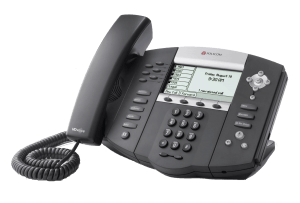 Business Phone: You can certainly order up another landline from your phone company, but many people are cutting the cord and just using their cellphone. There is another option – an IP phone service. In addition to the popular Vonage, you might want to consider a fairly low-cost alternative: Line2. About $12/month (they have a $15/month plan for small business), this not only gives you one or more business lines, but a full-featured automated voice-answering system that makes your home-based business sound just like the Fortune 500 companies. Line2 also has an app that you can put on your smartphone which lets your smartphone actually have a second phone number – it can either ring through the app, or calls can be automatically forwarded to your mobile number. A few other things to think about:
Business Phone: You can certainly order up another landline from your phone company, but many people are cutting the cord and just using their cellphone. There is another option – an IP phone service. In addition to the popular Vonage, you might want to consider a fairly low-cost alternative: Line2. About $12/month (they have a $15/month plan for small business), this not only gives you one or more business lines, but a full-featured automated voice-answering system that makes your home-based business sound just like the Fortune 500 companies. Line2 also has an app that you can put on your smartphone which lets your smartphone actually have a second phone number – it can either ring through the app, or calls can be automatically forwarded to your mobile number. A few other things to think about:
- Business phone number, aka vanity number: For a small fee you can get a toll-free number, and you can also choose from available numbers that work with your business – such as our company (we are PosiTek.net, and our toll-free number is 855-Pos-iTek).
- Automatic switching and other business services. Even if you’re a one-person shop, you can easily have separate numbers for sales, service, etc. They’ll all ring through to you, but callers won’t know that, and you can benefit from knowing what type of call is coming in based on what number they called (it’ll show up in the app).
- Optional professionally recorded announcement. For a one-time fee you can have the announcement of your choice recorded by a professional voice, instead of your own. That adds a persona of professionalism that can be hard to fake, assuming you can even get your sister-in-law to record your message for you!
![]() Email and then some: A lot of businesses run on Microsoft Exchange services and Outlook. Coupled with your own domain (you@yourcompany.com) is a lot more professional than using a gmail or hotmail account for your business. Lots of choices out there, my favorite is Sherweb Hosted Exchange, which starts at under $8/month per account. You can use Outlook on a Mac or PC, or use the Mac’s native apps (calendar, contacts, email, tasks, notes), as well as using it with your smartphone or tablet and have everything fully synchronized between all the devices. You can even get to your account from any computer using Outlook Web Access, which gives a very Outlook-feeling view while operating within a standard web browser.
Email and then some: A lot of businesses run on Microsoft Exchange services and Outlook. Coupled with your own domain (you@yourcompany.com) is a lot more professional than using a gmail or hotmail account for your business. Lots of choices out there, my favorite is Sherweb Hosted Exchange, which starts at under $8/month per account. You can use Outlook on a Mac or PC, or use the Mac’s native apps (calendar, contacts, email, tasks, notes), as well as using it with your smartphone or tablet and have everything fully synchronized between all the devices. You can even get to your account from any computer using Outlook Web Access, which gives a very Outlook-feeling view while operating within a standard web browser.
Miscellaneous: You might have need of various services or capabilities, depending on the nature of your home-based business. Here’s just a few examples. Feel free to leave a comment below on your specific needs and I can give you more directed advice.
 Online presence aka a website: tons of website hosting companies, businesses can choose from the cheap providers like GoDaddy.com or Bluehost.com, or step up to more professional hosts. WordPress is a very powerful engine that runs a good portion of the worlds’ websites, and two great professional-level hosts I know about are https://wpengine.com and https://websynthesis.com/.
Online presence aka a website: tons of website hosting companies, businesses can choose from the cheap providers like GoDaddy.com or Bluehost.com, or step up to more professional hosts. WordPress is a very powerful engine that runs a good portion of the worlds’ websites, and two great professional-level hosts I know about are https://wpengine.com and https://websynthesis.com/.- Fax service: if legal documents and legal signatures are a big part of your business, you might want a fax service like https://efax.com on your side. Sure you can use your multi-function device to send out faxes, but short of having to dedicate a landline at home for faxes or deal with using the same line for voice and fax (bad idea), a fax service can give you a dedicated fax number, receive all incoming faxes and deliver them as pdf’s to your email inbox.
 Video/webcam: If you’re going to be doing some casual videos, a webcam may be all you need, such as a Logitech HD Pro Webcam C920, about $65 from amazon.com. More formal and professional and you’ll want a good HD camcorder, such as the Canon XF100, about $2k from BHPhotovideo.com. Add tons of accessories (tripod, greenscreen, etc.) from Green Screen Systems.
Video/webcam: If you’re going to be doing some casual videos, a webcam may be all you need, such as a Logitech HD Pro Webcam C920, about $65 from amazon.com. More formal and professional and you’ll want a good HD camcorder, such as the Canon XF100, about $2k from BHPhotovideo.com. Add tons of accessories (tripod, greenscreen, etc.) from Green Screen Systems.- Specialized software: Depending on the nature of your business, you might need image editing software like Adobe Photoshop, video editing software like Avid Media Creator, Microsoft Office 365 for productivity programs, and more.
- Messenger/Delivery Services. If you need secure document or package delivery services, be sure to check around your local area. Here in the metropolitan Washington DC area, we like WashingtonExpress. For general package delivery, USPS, Fedex and UPS all offer competitive rates.
Please leave a comment with some details about the specific type of business you’re running and/or the services or capabilities you need and I can zero in on more specific recommendations for you.
This website runs on a patronage model. If you find my answers of value, please consider supporting me by sending any dollar amount via:
or by mailing a check/cash to PosiTek.net LLC 1934 Old Gallows Road, Suite 350, Tysons Corner VA 22182. I am not a non-profit, but your support helps me to continue delivering advice and consumer technology support to the public. Thanks!
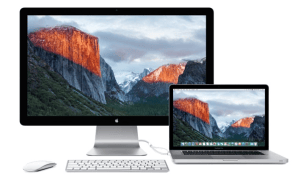 Mobile Mac: If you prefer Apple’s wares, then a great arrangement would be a
Mobile Mac: If you prefer Apple’s wares, then a great arrangement would be a 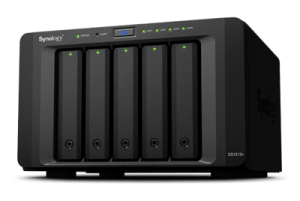 Mac: An
Mac: An  Online presence aka a website: tons of website hosting companies, businesses can choose from the cheap providers like GoDaddy.com or Bluehost.com, or step up to more professional hosts. WordPress is a very powerful engine that runs a good portion of the worlds’ websites, and two great professional-level hosts I know about are https://wpengine.com and https://websynthesis.com/.
Online presence aka a website: tons of website hosting companies, businesses can choose from the cheap providers like GoDaddy.com or Bluehost.com, or step up to more professional hosts. WordPress is a very powerful engine that runs a good portion of the worlds’ websites, and two great professional-level hosts I know about are https://wpengine.com and https://websynthesis.com/.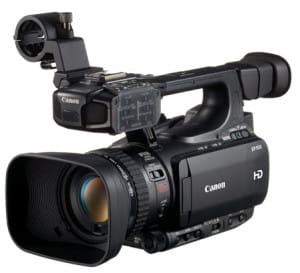 Video/webcam: If you’re going to be doing some casual videos, a webcam may be all you need, such as a
Video/webcam: If you’re going to be doing some casual videos, a webcam may be all you need, such as a 





